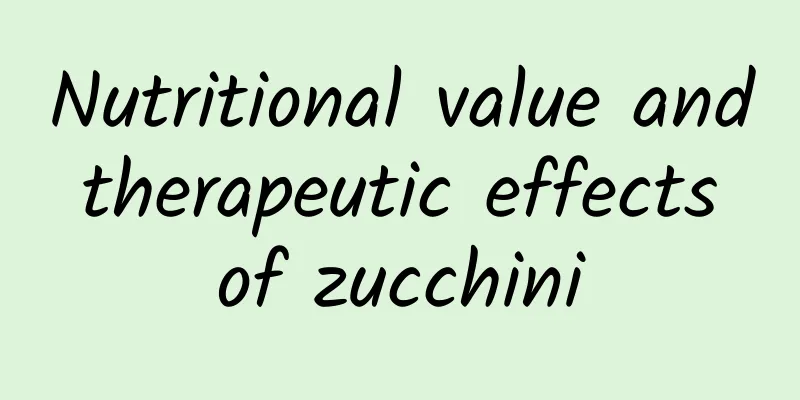Nutritional value and therapeutic effects of zucchini

|
Zucchini is a very good melon vegetable. We often see it on our dining table. Let’s see what nutritional value it contains. Nutritional value of zucchiniZucchini contains a lot of nutrients such as vitamin C and glucose, especially calcium. The nutrient content of each 100g edible part (fresh weight) of different varieties is as follows: protein 0.6-0.9g, fat 0.1-0.2g, cellulose 0.8-0.9g, sugar 2.5-3.3g, carotene 20-40 micrograms, vitamin C 2.5-9 mg, calcium 22-29 mg. Zucchini Benefits:Traditional Chinese medicine believes that zucchini has the functions of clearing away heat and promoting diuresis, relieving restlessness and quenching thirst, moistening the lungs and relieving cough, and reducing swelling and dispersing lumps. It can be used as an auxiliary treatment for edema, abdominal distension, thirst, sores, nephritis, ascites caused by liver cirrhosis, etc. Zucchini contains an inducer of interferon, which can stimulate the body to produce interferon, improve immunity, and play an anti-viral and anti-tumor role. Zucchini is rich in water and has the effect of moisturizing the skin.Health Benefits: Zucchini has the functions of clearing away heat and promoting diuresis, relieving restlessness and quenching thirst, moistening the lungs and relieving cough, and reducing swelling and dispersing nodules. It can be used as an auxiliary treatment for edema, abdominal distension, thirst, sores, nephritis, ascites caused by liver cirrhosis, etc. 1. Zucchini is rich in water and can moisturize the skin; 2. Zucchini regulates human metabolism and has the effects of weight loss, anti-cancer and cancer prevention; 3. Zucchini contains an interferon inducer, which can stimulate the body to produce interferon, enhance immunity, and exert anti-viral and anti-tumor effects.Related groups:1. It is edible for general population. 2. People with weak spleen and stomach should eat less.Dietary effects:1. Zucchini has the effects of clearing away heat and promoting diuresis, relieving restlessness and thirst, moistening the lungs and relieving cough, and reducing swelling and dispersing nodules; 2. It can be used as an auxiliary treatment for edema, abdominal distension, thirst, sores, nephritis, ascites due to liver cirrhosis, etc. 3. Zucchini contains an inducer of interferon, which can stimulate the body to produce interferon, improve immunity, and play an anti-viral and anti-tumor role. Zucchini is rich in water and has the effect of moisturizing the skin. |
<<: How to eat zucchini How to make zucchini delicious
>>: Tips for growing chili pepper
Recommend
How is Alpina? Alpina reviews and website information
What is Alpina? Alpina is a German automobile manu...
What is sesame oil? What is the difference between sesame oil and sesame oil?
Do you know what sesame oil is? When making sesam...
The efficacy and function of lentils
Lentils, also known as string beans or string bea...
What is the Ministry of Interior of Angola like? Reviews and website information of the Ministry of Interior of Angola
What is the website of the Ministry of the Interio...
The nutritional value of corn leaves and the effects and functions of corn leaves
Corn leaves are the leaves of the plant corn. Mos...
How is the University of Akureyri? University of Akureyri reviews and website information
What is the website of the University of Akureyri?...
How is World Journal? World Journal review and website information
What is World Journal? World Journal (formerly kno...
The benefits of eating millet
Millet is a grain crop produced in northern China...
Glenmorangie Whisky_How is Glenmorangie? Glenmorangie Whisky_Glenmorangie Reviews and Website Information
Glenmorangie Whisky_What is Glenmorangie website? ...
How to eat longan meat best? What are the benefits of longan meat soaked in water?
Longan flesh is a kind of dried fruit ingredient ...
What is Sensi Soft like? Sensi Soft company review and website information
What kind of website is Sensi Soft? Sensi Soft is ...
The efficacy and function of small walnut meat and the method of eating small walnut meat
Small walnut meat is also called small walnut ker...
The effects and functions of lemonade and the side effects of lemonade
In the hot summer, people like to drink sweet and...
The efficacy and function of cucumber juice
The most wonderful thing in summer is to drink a ...
The efficacy and effects of Viagra. Precautions for taking Viagra
In life, some men will take some Viagra when they...









